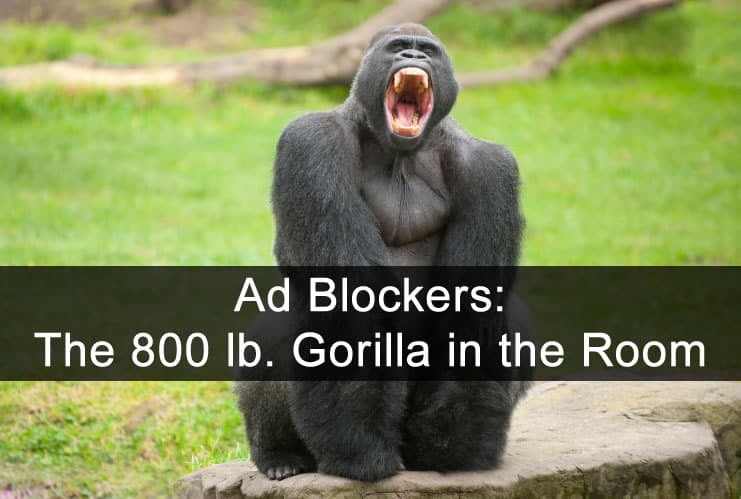
Let’s discuss ad blockers, the 800 pound Gorilla in the room and what that may do to websites that primarily earn revenue from display ads.
[toc wrapping=”right”]If this is your first visit to this site, here’s my background. I’m a niche site publisher. I share a lot of what I do growing my niche site business on this site.A good portion of my niche site revenue is display ads (five figures per month). Therefore, the growth of ad blockers is a concern I must consider for the future of my niche sites.
I’m a realist (ad blockers will impact many publishers including me), but am staying positive by taking action which includes looking out for the opportunities this momentous internet develop may offer.
I reached out to Chris Lee at RankXL and asked him his thoughts about ad blockers. If you don’t know Chris, he earns more than $20,000 per month with AdSense. Here’s what he said to me:
This post sets out what I’m doing about the growth of ad blockers, what I hope will happen, what I think will happen and hammering the point home that change equals opportunity.
While ad blockers are potentially bad for my online business, I’m moving in a direction where I don’t think it will be catastrophic. But I’m moving in that direction now.
What am I doing about the growth of ad blockers?
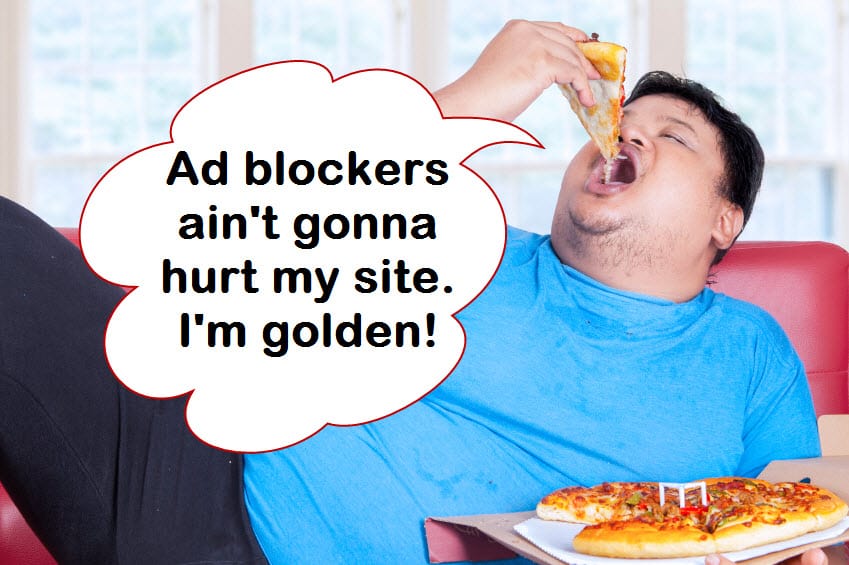
Fortunately I’m diversified. My overall income is divided between affiliate commissions (approx. $15K per month), local marketing work and display ads. I’m diversified enough that I’ll eat if my display ad revenue disappears tomorrow.
Nevertheless, losing display ad revenue would not be cool. It would be a huge set back. It would devalue my websites. You get the point. This would be the case for many site owners.
1. Increase affiliate promotions
I’ve mentioned this before, but affiliate revenue growth from my authority sites has been disappointing. I started my biggest site with the intention to primarily monetize with affiliate offers, but display ads turned out to be far more lucrative.
Nevertheless, affiliate commissions do grow little by little over time. Therefore, I’m putting more effort into generating more revenue from affiliate offers.
Do Ad Blockers block affiliate links?
I’m pretty sure there are cloaking methods to get around this. I cloak all outbound links from my growing affiliate store and on-site. I have more testing to do though. In short, I don’t have an answer with respect to the technical aspect of affiliate links, but I’m pretty sure there will be a solution.
Which leads me to wonder if affiliate links can be cloaked in such a way to avoid ad blocker detection, why can’t display ads?
Again, this may be going down the technical cat and mouse game, but perhaps there is a way to code ads in such a way that ad blockers will never detect them. That would be fantastic.
2. Wait and See
An optimistic part of me agrees with Chris Lee above; however, I’m also preparing for the worst. I continue building my B2C sites to earn with display ads, but I’m diversifying revenue streams at the same time.
 Other than work hard on generating more revenue from affiliate commissions, I’m currently in wait and see mode. I’m not the only publisher vulnerable to ad blockers. In fact billion dollar companies are vulnerable big time.
Other than work hard on generating more revenue from affiliate commissions, I’m currently in wait and see mode. I’m not the only publisher vulnerable to ad blockers. In fact billion dollar companies are vulnerable big time.
Maybe billion dollar companies will buy ad blockers?
Who knows, maybe Google (highly vulnerable) or even Facebook (I’m not sure if ad blockers block FB ads, but if they do, that’s not good for Facebook) will buy up ad blockers. That would be an ideal solution.
Technical Cat and Mouse Game
Perhaps ad networks will enter a cat and mouse game with ad blockers where ad networks come up with technology to skirt ad blockers, who then figure out how to block and so on and so forth. I doubt this will be the long term solution because an awful lot of resources go into wasted efforts.
Besides, ad blockers are costing the ad industry billions of dollars already, which means if there were a technical solution, you’d think it would be found already.
Ad Networks may collaborate with adblockers
Maybe companies like Google and Facebook will likely collaborate with adblockers coming up with a solution such as ad design and placement restrictions.
I don’t like this because it will tie publishers’ hands, but more importantly, I believe ad blockers will always give their users the option to block all ads anyway.
On the flip side, if publishers get whitelisted AND ad networks are approved with ad blockers AND enough ad blocker users don’t block ads altogether (i.e. they accept some ads), I have a hunch ad revenue on a CPC basis will increase. There will be much less ad inventory available, which means more bidding for fewer spots which means more revenue per click (or per 1,000 views).
While I doubt this will fully compensate for lost revenue, it will help.
Adopt new monetization models
If ad networks do nothing serious and their ads no longer show up on the internet, new monetization models will be embraced such as forcing users to pay for content and more native advertorial style of advertising.
The problem with these monetization models is they’re only really available to large brands with a lot of traffic. Smaller publishers will have a hard time generating content people will pay for and will not have the resources or audience to sell advertorials. I’m not saying this will be impossible, but it will be hard.
A good example of ad evolution is television. With the growth of Tivo and similar technology, fewer people see ads, which reduces the money networks can charge for ads. The evolution has moved into a subscribership model where viewers pay for various channels, packages and of course streaming services such as Netflix.
Our household spends far more on television than most households did 20 years ago because we have add-on channel packages and Netflix. We’ll probably get more streaming services too. However, in return we watch very few ads.
One ad blocker solution I think could work
The way I understand it, ad blockers block known links that reveal that they are advertising other websites.
What if a technology was developed where the ads never took visitors off the publishers website and instead sent visitors from an ad to a page on the same publisher’s site that promoted whatever the advertiser was promoting. In fact, I’m sure software could automatically create a page that looks just like the advertiser’s website.
OR, the ad can promote an advertorial on the publisher’s site that’s automatically created via the ad network.
What this concept means is ads never take visitors off the publishers’ website, yet effectively promote the advertiser.
The only sticking point is tracking elements in the link code (i.e. tracking publisher revenue for instance) which may trigger ad blockers. I’m merely musing about conceptual solutions at this point.
3. Apply to be whitelisted with ad blockers

Currently, my sites would not be approved to be whitelisted with ad blockers because of my in-content ads. However, if push comes to shove, I’ll adjust ad placements and apply to get my sites whitelisted with the biggest ad blockers that offer this.
For push comes to shove means my ad revenue must be super low in order to adjust ad placement to comply with whitelisting terms. I can tell you after reviewing the terms for getting whitelisted that ad revenue will be pretty much non-existent for most sites.
An even bigger negative here is that ad blocker users can still adjust settings so no ads show up. What I don’t know is whether most ad blocker users set it so no ads show up or they let some ads show up as configured with whitelisted sites. I don’t know. Nevertheless, it is good to read that ad blockers have settings where some ads show up for whitelisted sites… they understand ads fuel the web (for now).
What will I do if display ad revenue disappears? Do I have a plan B?
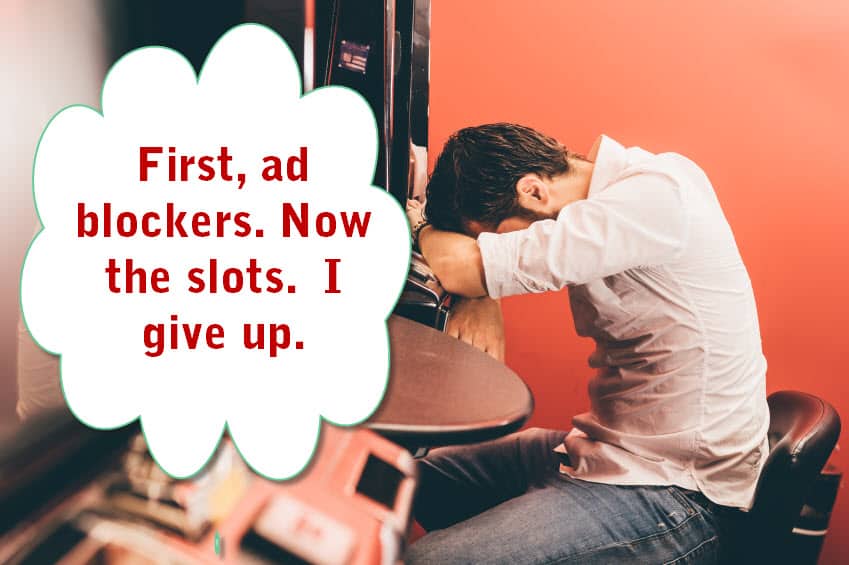
I’ll focus on affiliate revenue and perhaps grow my local marketing work. I prefer publishing huge B2C authority sites, but I’d be happy working on local marketing campaigns and affiliate focused sites. My authority sites do okay with affiliate offers so I would focus growing them with affiliate revenue in mind as the main revenue source.
I’d explore other models too including more e-commerce and/or offering services. Money still fuels the web so there are plenty of other methods to earn a living online.
Should I sell my successful authority sites now while there’s still display ad revenue?
It’s something I’m always considering, but I’m growing fast and would hate to sell before some more growth so that I could get a higher sale price. I consider it each week.
What do I think will happen?
I hope everyone in the world realizes websites are free because of ads and will boycott ad blockers.
Ha, that’s never going to happen. Wake up and smell the coffee Jon. People hate ads and if it’s easy for them to surf the web without them, they will. I do that with Tivo and Netflix and I earn part of my living from advertising.
In all seriousness, I’ll mostly wait and see and ramp up affiliate revenue. Maybe the whole ad blocker thing is being blown out of proportion. Maybe people like ads because they want the full website experience. After all, people do click ads.
Yes, millions of people use ad blockers; however, more and more people are online for longer periods of time too.
I think developing an additional revenue stream as well as the wait and see plan is good for now.
Best case scenario that’s maybe possible: Billion dollar ad networks buy up all ad blocker companies.
The problem here is the ad networks will be buying new ad blocking companies every month or week. After all, if you were guaranteed a buy out from a billion dollar company it would be tempting to start an ad blocking service and sell in 12 months for millions of dollars.
Realistic scenario 1: Publishers will be forced to pursue alternative monetization such as affiliate revenue (performance based marketing), advertorials, endorsements and subscriptions.
Realistic scenario 2: Whitelisting and collaboration. Ad blockers will whitelist websites that are approved and ad networks will have to be dictated to by the biggest ad blockers. It will no doubt be humbling for Google and Facebook to get approval for ad placements and designs, but this is possible.
Realistic scenarios 1 and 2 will work together. Let’s face it, if ad blockers dictate to publishers what type of ads they can use and where they can place them, ad RPM will plummet. That means in order to make publishing worth it, publishers will need to bolster ad revenue (if they’re lucky enough to be whitelisted) with alternative revenue streams.
At the end of the day, I’m realistic and staying positive. I’m realistic in that I know my ad revenue will take a hit. I’m staying positive because I don’t think ad blockers will end my online career or result in my dumping my sites.
If you’ve been working online for a few years, you know things change. I’ve been directly impacted by 2 huge changes. The first was Google Penguin (OUCH, that hurt). The second was Facebook reducing reach with page posts (hurt a little, but wasn’t too bad).
Should you start a website that’s monetized with display ads?
Yes, but build a site that can be monetized in other ways as well AND understand that display ad revenue will very likely shrink. Enjoy ad revenue while it’s still here, but also develop other revenue streams at the same time. Affiliate offers is a good one for smaller publishers like me.
However, if you’re torn between 2 website models and one doesn’t include display ads, go the non-display ad route. I continue with display ad sites because I have alternative monetization options which I’ll be growing.
Did ad arbitrage kill the golden goose?
With the advent of low cost traffic in recent years (Facebook ads and native ads) along with the growth in display ad monetization (AdSense, exit intent ads, native ads, interstitials, etc.), one wonders whether such aggressive ad placement killed the golden goose? You know what I’m talking about – good ole ad arbitrage.
We’ll never know, but I don’t think so. Yes, some sites are super annoying with ads, but for the most part the biggest sites in the world that attract most of the traffic aren’t too annoying.
I think ad blocker growth like we’re experiencing now was inevitable especially now that mobile devices make it so easy. Moreover, ads are more annoying on mobile devices than desktop and so people are more motivated to seek out an ad blocker while surfing on their mobile devices than they are on desktop computers. Ad blockers are just part of the mobile revolution.
Change = Opportunities
Less competition
Ad blockers will kill many websites. That I’m sure of. Even if whitelisting works and ad blocker users accept some ads while they surf the web, the decrease in revenue will hurt.
What this means is opportunity. If you can monetize in ways the deceased sites couldn’t, you can take advantage of that traffic.
For example, in one of my niches, most of my competitors monetize solely with display ads. That’s good because I also monetize with affiliate offers. If I can survive and they don’t, that’s more traffic for me, which is a good thing.
Ads worth more to advertisers
If you can place ads on your site that are seen by visitors, those ads will be worth more than individual ads today. That could be a boon for some sites.
Ad Blocker Wrap Up
Where this ends up is anybody’s guess. I’m amazed there are so many new ad networks popping up. I get contacted by a new ad network every week. It’s one thing being a publisher, but ad blockers are even a bigger threat to ad networks – unless they’re the network that comes up with a permanent way to skirt the ad blockers. Now that’s a patent I’d like to come up with.
For now I keep on publishing and work in on increasing affiliate revenue in preparation for the possible day where ad revenue is merely a trickle.
While I’m a realist, I still have trouble believing a solution favoring ad networks and publishers won’t materialize. Surely Google has something up their sleeve.
What are your thoughts on ad blockers? Leave a comment below.

Jon Dykstra is a six figure niche site creator with 10+ years of experience. His willingness to openly share his wins and losses in the email newsletter he publishes has made him a go-to source of guidance and motivation for many. His popular “Niche site profits” course has helped thousands follow his footsteps in creating simple niche sites that earn big.

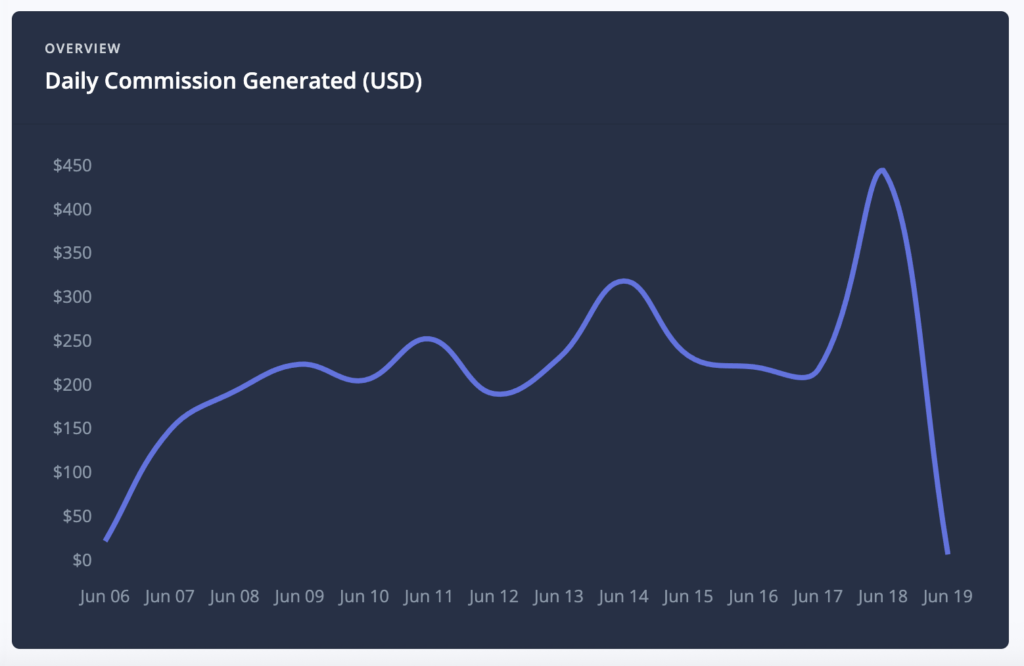
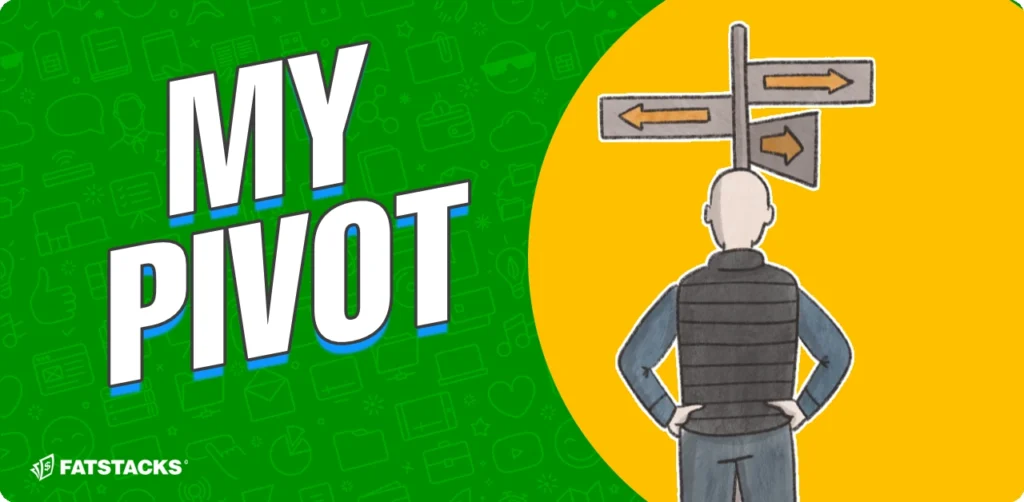



Great post, and interesting to see what you will be doing to make up for the, perhaps inevitable, loss of income.
I wonder if there is a way to go down the route of reaching out to advertisers to create bespoke advertising campaigns specifically for the niche of your website and then negotiating about placements and so on.
One could skirt around the whole tracking software issue by maybe using a high quality heat map and create a report based on how many click through they get?
I am not really au fait with ads right now, but just my 2 cents.
Hey Harry,
I think IF ad blockers put a dent in revenue, more personalized advertising will be one solution. Huge sites already do this. However, it depends on what ad blockers do to detect ads… for example if they look for IAB banner sizes, even if there is no tracking coding, they may trigger a block. I read one suggestion to make such ads slightly different sizes than IAB ads to avoid that detection.
John, we’ve definitely seen that as AdBlockers are becoming increasing powerful and monetizing on themselves, that they are also becoming more sophisticated at blocking more ads. Not only have then been blocking regular ads but also some native ads and affiliate ads (although they are definitely blocked much less than normal ads). Needless to say though, that AdBlockers are being downloaded at an incredible rate right now and it’s going to continue to be an increasing problem.
You can code to detect if the users had a adblock active. If they do, instead show display ads, show affiliate links or use Taboola ( they pay to be whitelisted a few years ago ).
Very soon this site will be famous amid all blogging visitors, due to it’s good
posts
Hi Jon, thanks for the interesting post. About monetarization, but on a different issue, pls let me ask for your advice on a new blog that I want to create. My objective is that even when working full time on in, and investing, at the end of the fist month, I could have a net profit of 300 usd. What kind of resource should you advice me to read before starting this project? I think that the niche tycoon can be interesting, also the 20 -40 000 month report. I am considering also options as an e-book or a good post with fb ads incoming and affiliated outcoming traffic. Thanks in advance for your comments. Happy weekend.
You can easily create an anti-ad blocker that shows alternative ads in case ad blocker is active on the users browser
Krishna, you can but AdBlockers have been attacking those types of solutions pretty aggressively now.
It is interesting and when I see how much of top paid advertisers are essentially doing traffic arbitrage it makes you wonder. Check out list of recent top spenders..also the list of publishers where those advertisers are running ads are just basic arbitrage sites…
http://www.adbeat.com/blog/the-top-20-advertisers-of-q4-2015/
Its hard to imagine that adsense would get blocked though ?
Brian, AdSense gets blocked. Google pays the AdBlockers each year to let their AdWords get through when someone does a Google Search but they have not paid (as of now) to have AdSense show up on other people’s sites that are running the network.
I agree with Brian above: it should give everyone a bit of peace-of-mind that Google has more skin in the ad game than anyone. They also have the biggest browser, and Chrome’s market share grows by the day. Are ad blockers growing? Sure. Will Google let AdSense die? Probably not–at least not without another way to make money off/with advertisers.
Perrin, Google Chrome was in a battle with the AdBlockers but now they’re some of the top downloaded extensions for Chrome. I doubt Google would ever let AdSense die, but I also think that Google is trying to stay neutral on the battle for now. They pay a lot of money to have AdWords show but have not taken it to the individual level of paying to make sure ads get through on everyone’s website that runs AdSense.